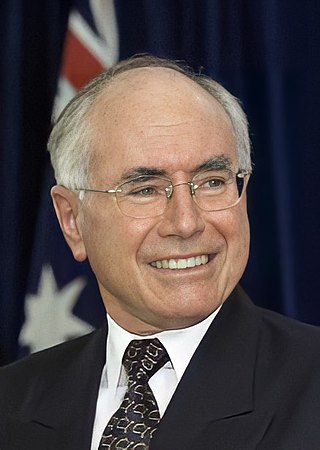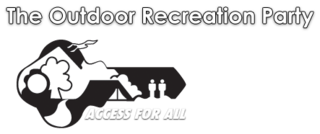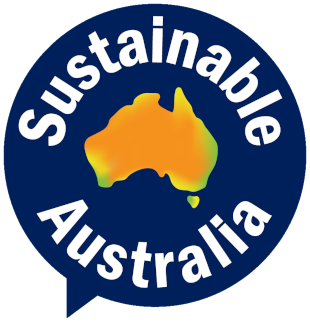Related Research Articles

The Australian Democrats is a centrist political party in Australia. Founded in 1977 from a merger of the Australia Party and the New Liberal Movement, both of which were descended from Liberal Party dissenting splinter groups, it was Australia's largest minor party from its formation in 1977 through to 2004 and frequently held the balance of power in the Senate during that time.

The 2004 Australian federal election was held in Australia on 9 October 2004. All 150 seats in the House of Representatives and 40 seats in the 76-member Senate were up for election. The incumbent Liberal Party of Australia led by Prime Minister of Australia John Howard and coalition partner the National Party of Australia led by John Anderson defeated the opposition Australian Labor Party led by Mark Latham.

The Nuclear Disarmament Party (NDP) was an Australian political party formed in June 1984. It was founded by medical researcher Michael Denborough as the political arm of the Australian anti-nuclear movement, which had been active since the early 1970s.

The Family First Party was a conservative political party in Australia which existed from 2002 to 2017. It was founded in South Australia where it enjoyed its greatest electoral support. Since the demise of the Australian Conservatives into which it merged, it has been refounded in that state as the Family First Party (2021), where it contested the state election in 2022, but failed to win a seat.

The Shooters, Fishers and Farmers Party (SFF) is an Australian political party. It primarily advocates for increased funding and services for rural and regional Australia, protecting the right to farm, enhancing commercial and recreational fishing, tougher sentencing for illegal firearm trade and usage, and relaxing gun control for law abiding citizens.

The Outdoor Recreation Party (ORP) was a minor political party originating in New South Wales (NSW), Australia. It professed to represent the outdoor community and interests such as cycling, bushwalking, camping, kayaking, 4WD motoring, skiing, fishing and shooting. It was formally allied with the Liberal Democratic Party.

The Liberal Democratic Party, shortened as LDP, Liberal Democrats, or Lib Dems, is an Australian political party founded in Canberra in 2001. The party espouses smaller government and supports policies that are based on classical liberal, libertarian principles, such as lower taxes, opposing restrictions on civil liberties, decentralisation, utilising nuclear energy, and the relaxation of smoking laws.
The Climate Change Coalition (CCC), briefly known as 4Change, was an Australian political party, which was formed in 2007 with a view to accelerate action by politicians from all parties on global warming and climate change. Its position on working towards addressing climate change stressed cooperation with big business in order to achieve significant progress on the issue. The party therefore advocated a close working relationship between environmentalists and the business community. The CCC was registered as a political party with the Australian Electoral Commission (AEC) on 4 September 2007 and deregistered on 25 March 2010.
Environmentalists for Nuclear Energy Australia, formerly called Conservatives for Climate and Environment, was a political party registered in Australia from 2007 to 2010. EFN-Australia referred to itself as a not-for-profit environmental association, registered as a political party. It was the Australian affiliate of Environmentalists for Nuclear, and the party campaigned unsuccessfully to gain nuclear power in Australia.
Patricia May Petersen is an Australian academic from Ipswich, Queensland.

Pirate Party Australia is a political party in Australia that had traditionally represented civil liberty issues, but had also expanded into more traditional areas of policy. It was a Pirate Party which was based on the Pirate Party of Sweden, and continued to develop a comprehensive policy platform since its formation based on the Pirate ethos.

The Sustainable Australia Party, formerly the Sustainable Population Party, is an Australian political party formed in 2010.

The WikiLeaks Party was a minor political party in Australia. The party was created in part to support Julian Assange's failed bid for a Senate seat in Australia in the 2013 election, where they won 0.66% of the national vote. At the time Assange was seeking refuge in the Ecuadorian embassy in London. The WikiLeaks Party national council consisted of Assange, Matt Watt, Gail Malone, Assange’s biological father John Shipton, Omar Todd and Gerry Georgatos. The party experienced internal dissent over its governance and electoral tactics and was deregistered due to low membership numbers in 2015.

The United Australia Party (UAP), formerly known as Clive Palmer's United Australia Party and the Palmer United Party (PUP), is an Australian political party formed by mining magnate Clive Palmer in April 2013. The party was deregistered by the Australian Electoral Commission in 2017, revived and re-registered in 2018, and voluntarily deregistered in 2022. The party fielded candidates in all 150 House of Representatives seats at the 2013 federal election. Palmer, the party's leader, was elected to the Division of Fairfax and it reached a peak of three senators following the rerun of the Western Australian senate election in 2014. When the party was revived under its original name in 2018, it was represented by ex-One Nation senator Brian Burston in the federal parliament.
The Mutual Party is a de-registered minor political party in Australia.

The Health Australia Party (HAP) is a political party in Australia, founded in 2013 as the Natural Medicine Party. It adopted its current name in 2015.

CountryMinded was an Australian political party between 2014 and 2018 that claimed to represent the interests of regional Australians whose livelihoods depend either directly or indirectly on agricultural production. The party was founded in December 2014 by a group of people looking for accountable regional representation, including two brothers from New South Wales, David and Peter Mailler as the Country Party of Australia, and changed its name to CountryMinded in September 2015. In 2018, the party merged with the Australian Democrats.
The Australian Sex Party was an Australian political party founded in 2009 in response to concerns over the purported increasing influence of religion in Australian politics. The party was born out of an adult-industry lobby group, the Eros Association. Its leader, Fiona Patten, was formerly the association's CEO.

The 2022 Australian federal election was held on Saturday 21 May 2022 to elect members of the 47th Parliament of Australia. The incumbent Liberal/National Coalition government, led by Prime Minister Scott Morrison, sought to win a fourth consecutive term in office but was defeated by the opposition Labor Party, led by Anthony Albanese. Up for election were all 151 seats in the lower house, the House of Representatives, and 40 of the 76 seats in the upper house, the Senate.

The Australian Federation Party (AFP), also known as AusFeds and formerly known as the Country Alliance and the Australian Country Party, is an Australian political party. Founded in 2004 by four rural Victorians, the party lodged its initial registration with the Victorian Electoral Commission on 15 August 2005.
References
- ↑ Wenham, Margaret (2 April 2007). "Women's party is born". Courier Mail. Retrieved 4 April 2007.
- ↑ Australian Electoral Commission, Virtual Tally Room, Senate Preferences by Group, retrieved November 2007
- ↑ ABC, Australia Votes 2007, Senate results, retrieved November 2007
- ↑ Australian Electoral Commission. "What Women Want". Deregistered political parties. Australian Electoral Commission. Retrieved 20 July 2012.